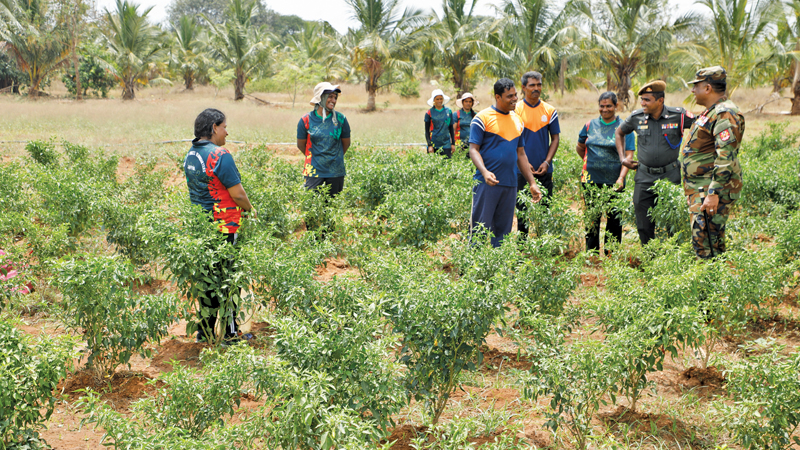May 18, 2024 marks the 15th anniversary of the end of Sri Lanka’s three-decade long war. On this day, we remember with gratitude all war heroes who made that possible. Many of them made the supreme sacrifice, many others are permanently disabled, but they made peace possible at the end of the day.
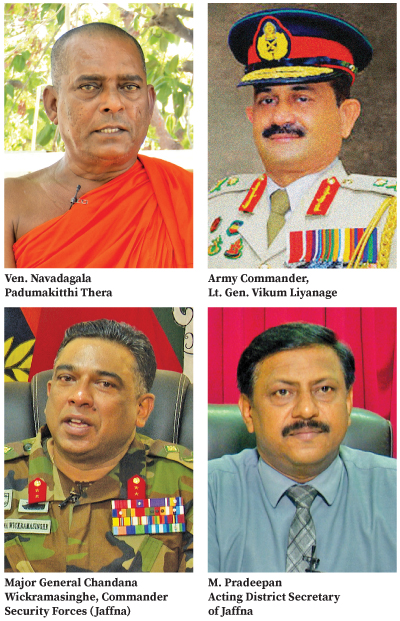 The people of the post-war North have since embarked on the arduous journey towards peace, harmony, and development they have long yearned for. The reality, however, is far from idyllic. After enduring years steeped in hopelessness and peril, they are gradually embracing a life imbued with newfound hope. Accordingly, the people are making significant strides in political, economic, social, cultural, and religious spheres as they work towards realising their aspirations. In this journey, the Armed Forces have continued to support the people of the North.
The people of the post-war North have since embarked on the arduous journey towards peace, harmony, and development they have long yearned for. The reality, however, is far from idyllic. After enduring years steeped in hopelessness and peril, they are gradually embracing a life imbued with newfound hope. Accordingly, the people are making significant strides in political, economic, social, cultural, and religious spheres as they work towards realising their aspirations. In this journey, the Armed Forces have continued to support the people of the North.
In an interview with the Sunday Observer, Commander Security Forces (Jaffna) Major General Chandana Wickramasinghe shed light on the Sri Lanka Army’s effort to support the populace. Excerpts from the interview:
Q: Fifteen years after the war’s end, how would you describe the general administration and daily life in Jaffna?
A: Having spent most of my time in the North, I have a deep understanding of the heartbeat of these people. Today, they approach life with more hope than in the past. Daily activities are carried out peacefully, with a strong focus on agricultural endeavours. The local economy is bolstered by fishing and trade, which also significantly contribute to the national economy.
Education has seen remarkable improvements, with children excelling academically and increasingly developing their sports skills. Achievements in these areas are numerous. Houses and buildings are being constructed and transformed, signalling substantial progress. In fact, people are beginning to forget that there was even a war. Administrative work in the Northern Province is overseen by Governor P.S.M. Charles, and under her direction, the district secretariats manage tasks systematically and efficiently.
Q: How does the military contribute to improving the lives of the people and assisting them in their daily activities?
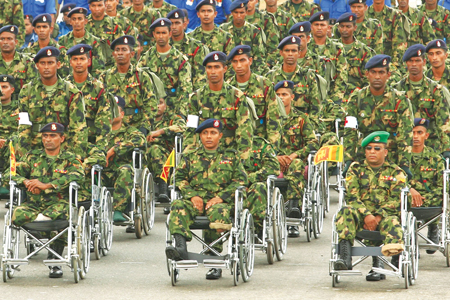
Disabled war heros
A: Today, the Army has become an indispensable part of their lives. This is largely attributed to the efforts of previous Security Forces Commanders and Area Commanders who fostered a strong bond between the people and the Army. Whenever people face challenging situations and require support, the Army consistently delivers the assistance they seek.
Up to now, we have constructed 787 houses entirely through the labour of the army. Remarkably, among the beneficiaries are former LTTE members who actively participated in the war. Their perception of us has undergone a complete transformation, reflecting the positive impact of our efforts.
Presently, we are renovating 10 hospitals. We offer school supplies, books, sports gear, and even food and beverages to children as needed. Over 5,000 bicycles have been distributed to school children alone. Leadership training programs are also being conducted. Inspired by my vision, the “Civic Park’’ stadium and children’s park in the Kopay area of Jaffna have become vibrant hubs for the community. The library serves as a vital resource for nurturing young minds, while the playground fosters the development of positive attitudes and sports skills among children.
People enthusiastically engage in weekly lectures, meditations, and spiritual programs aimed at enhancing their attitudes and knowledge. Perhaps most importantly, the strong bond between the people and the Army has led to the majority expressing a desire to maintain military bases at some level. This sentiment is rooted in the round-the-clock protection provided by the Army, as well as the unwavering support and companionship offered. We have successfully ensured 100 per cent security for the community.
Q: What is the current status of land release and military base evacuation (demilitarisation) efforts?
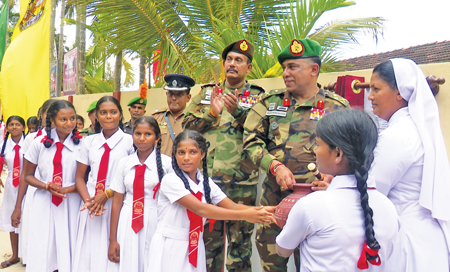
Northern children at school
A: As people continue to resettle, life has gradually returned to normality, prompting the Government to initiate the gradual release of lands to their rightful owners. On March 22, land deeds were ceremoniously granted, with the President’s participation, signifying the return of 234.8 acres of land in the Valikamam Divisional Secretariat Division in the North for cultivation. Following this allocation, the remaining land under the control of the Security Forces totals 2,927.69 acres. This accounts for less than 0.04 percent of the total land area. However, it is essential to note that we have not dismantled the camps situated in certain strategic locations. This practice is commonplace internationally and is crucial for maintaining the peace and security of a nation.
Q: What is the progress of demining efforts? Is complete removal imminent?
A: A dedicated team of 40 persons, including three women officers, has been established to enhance the efficiency of mine clearance operations. These soldiers are highly proficient and committed to their mission. To date, they have successfully cleared 26,560 square metres out of 55,056 square metres of landmines in the western part of Palali.
Out of these square metres, 12,336 square metres have been released to the civilian population. A few Non-Governmental Organisations (NGOs) are actively engaged in landmine removal efforts as well. However, the Government’s target by 2027 is to eliminate all landmines in Sri Lanka, transforming the entire country into a landmine-free zone.
The Jaffna District boasts a population of 630,738 individuals and comprises 208,964 families, encompassing a total land area of 1,025 square acres. Its administrative framework comprises one Municipal Council, 3 Urban Councils, 13 Pradeshiya Sabhas, and 435 Grama Niladhari Divisions, organised across 15 Divisional Secretariat Divisions, spanning 1,453 villages.
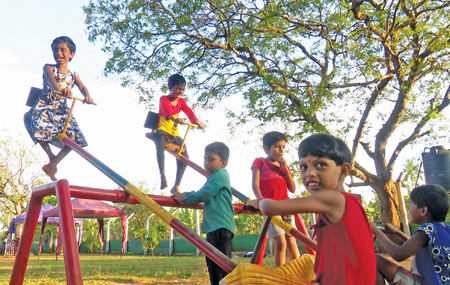
Northern children at a park
M. Pradeepan, the Acting District Secretary of Jaffna, shared his perspective on the land release issue.
The total land earmarked for release amounted to 23,850.72 acres. Of this, 21,226.43 acres have already been released, predominantly from areas affected by the conflict. On March 22, under the guidance of the President, 234.8 acres in the Valikamam Regional Division in the North were released for cultivation. This land allocation not only facilitates the recovery of livelihoods for the people but also promises a significant contribution to the national economy through agricultural activities. The collaboration between the people and the Army in these endeavours has fostered a peaceful environment conducive to progress.
To date, 40,041 families have been successfully resettled, yet there remains a pressing need for housing solutions for these individuals. This year, a substantial allocation of Rs.322 million has been designated from the decentralised budget for development initiatives in Jaffna. A total of 824 development programs have been proposed to address various needs and foster progress in the region.
A revered site for Buddhists in Jaffna is the historic Nagadeepa Vihara. During the visit, we met Ven. Navadagala Padumakitthi Thera, known for his commendable efforts in promoting religious harmony and unity among different ethnic groups. Through his dedicated religious work, he has earned the love and trust of the people, contributing significantly to fostering religious harmony in the region.
Similar to the atmosphere at Nagadeepa, the people of Jaffna now collaborate freely and peacefully. On the island, where the Nagadeepa Temple is located, both the temple and the people work hand in hand for various endeavours, fostering a close relationship. This collaboration extends to all aspects of communal life, including the organisation of festivals such as Thai Pongal, and Vesak. Acting as a bridge and providing protection, the Army plays a vital role in maintaining this harmonious environment.
Indeed, unlike Tamil politicians, the ordinary Tamils in the North harbour no desire for the removal of military camps or Armed Forces from their region. They maintain cordial relations with the Armed Forces personnel and actively seek their protection and support.
While certain politicians may attempt to sow divisions through inflammatory rhetoric to gain political advantage at forthcoming elections, the common people remain remarkably peaceful and harmonious in their interactions with the military. Religious harmony in the region is exceptionally strong, with no significant issues arising. The likelihood of another war is minimal, as long as there is no detrimental political intervention disrupting the peace and harmony that currently prevail.
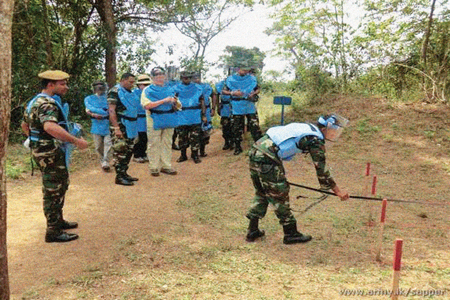
Mine clearing operations
Overall, the people of the North are collectively striving for development in a peaceful and harmonious manner, working towards the realization of their future aspirations. It is the responsibility of every citizen to honour these innocent wishes and prevent the spectre of war from casting its shadow on this land blessed by the Buddha during his three visits.
Contrary to popular belief, the Army, Navy, Air Force and Police/STF have a major role to play in peacetime as the Northern and Eastern region are still rising from the embers of war. Moreover, the security paradigm has shifted, with threats such as human trafficking, gun and narcotics running, transnational terrorism and even man-made Climate disasters increasing in scope and frequency.
Therefore, constant vigilance by the Security Forces is still the key to protecting the motherland from these evils, even though the threat of LTTE separatism is gone. As the Easter attacks showed, there could still be other threats to our peaceful coexistence.
Hence the importance of Intelligence, Surveillance and Reconnaissance (ISR) by the military, with new technologies such as Artificial Intelligence (AI), Machine Learning (ML) and military drones being increasingly used in defence operations to complement conventional methods. Our valiant Security Forces should be upgraded to meet these new challenges and new techniques.





